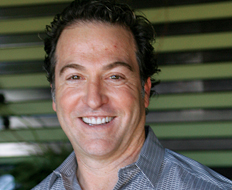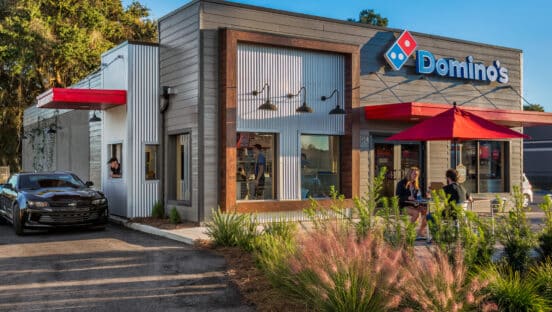There’s been no shortage of foodservice professionals who are striving to do right by their customers in the health department. Whether it’s brands offering healthier menu items or executives practicing what they preach about nutrition, the industry is coming together to bring real change to the way Americans eat and live.
Some, however, are going above and beyond all expectations in the fight against obesity. QSR asked readers to nominate people and brands in five categories—Menu/R&D, Marketing/Promotions, C-Suite, Franchisees/Local Community, and Suppliers/Producers—who they think have done the best job promoting a healthy, active lifestyle.
From dozens of submissions, these five stood out as some of the best in health and nutrition.
Menu/R&D:
Sharky’s Woodfired Mexican Grill
Mexican fast-casual concepts don’t always have the greatest reputation for health. Choosing among the tortillas, toppings, sauces, and proteins, customers can easily build their own calorie-stuffed burritos, tacos, or even salads.
Sharky’s Woodfired Mexican Grill is out to change that reputation. The Westlake Village, California–based brand is a farm-to-table concept with 20 locations and three more opening this year. While the brand still offers traditional Mexican favorites like burritos, quesadillas, and enchiladas, it’s the high-quality ingredients that help make it a healthy choice for California diners.
Steven Paperno, CEO and founder of Sharky’s, says processed foods bear the brunt of the blame for the nation’s obesity problems.
“Is sugar bad for you? Well, in the old days, it was sugar cane, and sugar cane is what sugar is derived from. You can have a stock of sugar cane, and it would take you forever to eat it,” Paperno says. “Now, what we’ve done is process that whole sugar cane into a condensed format that is used in every single food product, and you’re probably eating a whole stock of sugar cane in one sitting.”
At Sharky’s, the focus is on pure, natural ingredients. The brand uses organic tofu, beans, and rice; trans fat–free cooking oils; GMO-free corn; wild-caught fish; 100 percent natural chicken breast and Angus beef, without hormones or preservatives; and locally grown, organic baby kale, baby spinach, sweet baby greens, and Romaine lettuce.
Paperno says these ingredients cost more, but that Sharky’s builds the mark-up into menu prices. Despite this premium—burritos run about $7–$8, while a plate with two sides is around $11–$13—he says customers keep coming back for more of what he believes is fine-dining food in a quick-service setting.
“We’re not the cheapest game in town,” he says. “We can’t compete with the Taco Bells. We feel that people will pay for something that is good for them and that they love the taste of.”
Paperno, who founded Sharky’s in 1992, grew up in his parents’ delicatessen and has been passionate about health since he was a kid. That passion has extended beyond implementing a healthy Sharky’s menu; Paperno is on a mission to educate consumers about the importance of nutrition, from kids—Sharky’s has a healthy kids’ menu—on up.
“Everybody associates diet with weight. The challenge is our cells and our body deserve to be fed really good nutritional ingredients that support our immune system and support our bodies,” he says. “It’s not supposed to be how much weight I have to lose or gain. It’s supposed to be about nutrition. … When your immune system is up and working properly, most likely you will lose weight.”
Marketing/Promotions:
Garbanzo Mediterranean Grill
In summer 2012, Denver-based Garbanzo Mediterranean Grill was enjoying its fifth year in business selling healthier pitas, plates, and platters of Mediterranean-influenced meals.
But while the company had worked hard to incorporate its healthy message into social media, local-store marketing, and other communications channels, executives wanted to try something a little more attention grabbing.
“We were looking for a promotion that would drive excitement and energy and talk a lot about those brand attributes with our health, and how we have both the Mediterranean diet and we have specialty items that can fit into everyone’s everyday life,” says Cheryl Cassaly, director of marketing at Garbanzo.
Enter the Bean Tube Experiment.
Garbanzo teamed up with LiveWell Colorado, a nonprofit organization, on the Experiment, which placed six-foot clusters of garbanzo bean–filled tubes around Denver, Boulder, Colorado Springs, and Fort Collins. Each tube included a healthy message, such as “Colorado’s obesity rate has jumped from 19 percent to 22 percent. If Coloradoans jumped instead, these stats would reduce,” and a QR code that directed people to a healthy living microsite sponsored by Garbanzo and LiveWell Colorado.
The QR codes also provided deals for healthier fare at Garbanzo, giving customers reason to search for all of the bean-filled tubes.
“We really wanted to drive education and awareness outside of our four walls in a very unique manner that would actually have people question, What in the world is that thing?” Cassaly says. “They can go over and they can really interact with it.”
Cassaly says the microsite received more than 1,000 page views during the campaign, and the average visitor logged a healthy two-minutes-plus on the site.
“It’s an exciting way to work with people and fit into their lives, and we wanted to make sure that it was seen and very much experienced,” she says of the Bean Tube Experiment.
[pagebreak]
C-Suite:
Jim Mizes/Freebirds World Burrito
Plenty of quick-service executives have pushed healthy initiatives on their brands because they feel pressured by their board of directors or consumer base.
But Jim Mizes, president of Freebirds World Burrito, doesn’t just invest in health and wellness because it’s a growing trend in the quick-service and fast-casual industries. He does it because a healthy lifestyle is the core of everything he stands for.
Mizes, whose career includes eight years as president and CEO of Club One Fitness Centers, strives to eat healthy, and last year logged 100–150 miles per week on a bike, either in spin class or while riding around town as his primary form of transportation.
“Life begins with health. I don’t think you can lead, love, or do anything without good health,” Mizes says. “Great health gives you confidence and gives you stability, and therefore the strength to lead and support and help others. So it goes hand in hand [with healthy brand initiatives].”
Mizes has spearheaded a number of health-focused promotions at Austin, Texas–based Freebirds. In January, the brand invited customers to “ditch the tortilla” and order a burrito bowl, which has 260 fewer calories and 44 fewer carbohydrates than a regular burrito. The company also unveiled its “Carpe 500” tool, which includes a microsite where customers can find out which Freebirds combinations of burritos, burrito bowls, salads, and nachos have less than 500 calories. Mizes says there are “millions.”
But he says his personal healthy lifestyle doesn’t just influence the Freebirds menu—it also rubs off on his crew.
“I think personally, for me, the sense of good health provides me with the ability to take a stand that might not be the prevailing stand at the time, and to face the headwinds because I believe in it,” he says. “And because others on the team believe in it as well, [I can] lead others and help them understand why we’re going in this direction.
“So for me, good health and this balance of an active lifestyle with good, proper eating is really a confidence booster and is a strengthener.”
Franchisees/Local Community:
Fresh D’Lite
Fresh D’Lite may only have one unit, in Geneva, Illinois, but its efforts to make the community a healthier place have begun to have a widespread effect.
The fast casual, founded by former Sara Lee Foods vice president of innovation Paul Chaudury, along with his wife and two kids, is built around a healthy menu and a desire to get people cooking healthier foods at home.
Chaudury says there are three primary ways Fresh D’Lite communicates health to the community. The first is with its menu; all of the sandwiches, salads, pizzas, and noodle bowls that compose the menuboard are made without butter, cream, or processed ingredients, and everything is less than 550 calories.
“Everything at our place is health. But that’s not enough, because you eat 21 meals a week—you’re not going to eat 21 at our place,” Chaudury says. “That was our point: We have to teach you a little bit if you want to eat healthy.”
To do this, Chaudury and his team rolled out two resources for his customers. One was a book stationed in the restaurant that includes dozens of menus from area restaurants, highlighting nutritional information. The other was a cooking class that demonstrates how to make Fresh D’Lite items at home.
“We show them a sample of many breakfast, lunch, dinner, and snack items, and we show them how they can make them easily at home,” Chaudury says. “The teaching is different from typical health classes. Health class is a little bit academic. … Our goal is it has to be actionable and enjoyable. We primarily do this through serving our favorite meals, and as they are eating, explain how the meals are made.”
Fresh D’Lite’s next step in making Geneva—and the greater Chicagoland metro—healthier takes a page from celebrity chef Jamie Oliver’s book. Chaudury and his family hope to take their cooking classes to low-income neighborhoods and local high schools.
Giving the community a healthy education, Chaudury says, is good for waistlines and for business. But it’s also good for the soul, he says.
“When we offer the classes and presentations, they tell their neighbors, friends, and family to spread the news,” he says. “When a customer tells you that they’re now healthier than ever, that they’ve lost 20 pounds, and can you do a class for their neighborhood? These comments are so satisfying to hear.”
Suppliers/Producers:
Enjoy Life Foods
The healthy eating movement has really taken off in the last few years, but supplier Enjoy Life Foods has been baking up nutritious goods for a decade.
Joel Warady, chief sales and marketing officer at Enjoy Life Foods, says the company initially launched to provide foods that were both gluten free and free of the top eight food allergens (eggs, wheat, dairy, soy, peanuts, tree nuts, fish, and shell fish) for customers with intolerances. Since then, however, demand has skyrocketed among all consumers for better-for-you options that taste great.
“Taste was important [10 years ago], but what has happened over the last 10 years is the taste bar has been raised considerably,” Warady says. “Whereas 10 years ago people were just happy to get a product that was edible and that tasted OK, today they want a product that’s just as good as a gluten-filled product.”
Today, Enjoy Life Foods offers multiple lines of individually wrapped, grab-and-go products for foodservice operators. They include four flavors of lentil chips, which have 40 percent less fat than standard chips; four crunchy cookie options; and a seed-and-fruit trail mix that comes in two flavors.
All of the company’s products are now verified GMO-free, and are also kosher and Halal-certified. Enjoy Life Foods uses all-natural ingredients and is now focusing on how it can reduce sugars and add things like omega-3 and protein, Warady says.
He says operators are increasingly looking to add nutritious options that can be enjoyed by all consumers, but adds that making those products in-house can be a challenge.
“We’re experts at this. We have a dedicated gluten-free and nut-free facility, and it’s very difficult [for operators] to manage cross-contamination,” he says. “You’d have to find companies that are willing to build a new facility to make sure there’s no cross-contamination.
“We’ve spent the last 10 years building a trust relationship with the gluten-free, allergy-friendly consumer community,” Warady adds. “When they see the Enjoy Life name and the Enjoy Life logo, they know they can trust that product.”
While Enjoy Life Foods products are now mostly found in hotels, resorts, and corporate and hospital cafeterias, Warady says 2013 is the year he expects to break into major quick-service brands—good news for the 100 million Americans with food allergies or gluten intolerance, as well as for anyone looking for a tasty, better-for-you snack.
“We’re really starting to see the [quick serves] jump on this trend because the trend is not going away, and it’s just going to grow,” he says.







